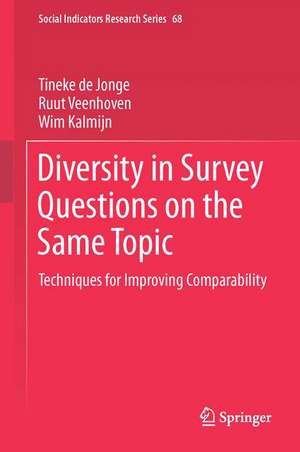Diversity in Survey Questions on the Same Topic: Techniques for Improving Comparability: Social Indicators Research Series, cartea 68
Autor Tineke de Jonge, Ruut Veenhoven, Wim Kalmijnen Limba Engleză Hardback – 7 mar 2017
| Toate formatele și edițiile | Preț | Express |
|---|---|---|
| Paperback (1) | 499.86 lei 39-44 zile | |
| Springer International Publishing – 21 iul 2018 | 499.86 lei 39-44 zile | |
| Hardback (1) | 601.13 lei 3-5 săpt. | |
| Springer International Publishing – 7 mar 2017 | 601.13 lei 3-5 săpt. |
Din seria Social Indicators Research Series
- 5%
 Preț: 861.64 lei
Preț: 861.64 lei - 18%
 Preț: 945.47 lei
Preț: 945.47 lei - 15%
 Preț: 644.30 lei
Preț: 644.30 lei - 18%
 Preț: 959.50 lei
Preț: 959.50 lei - 15%
 Preț: 645.60 lei
Preț: 645.60 lei - 18%
 Preț: 1234.94 lei
Preț: 1234.94 lei - 15%
 Preț: 640.06 lei
Preț: 640.06 lei - 15%
 Preț: 635.47 lei
Preț: 635.47 lei - 5%
 Preț: 1105.21 lei
Preț: 1105.21 lei - 15%
 Preț: 646.11 lei
Preț: 646.11 lei - 18%
 Preț: 1233.06 lei
Preț: 1233.06 lei - 18%
 Preț: 953.03 lei
Preț: 953.03 lei - 5%
 Preț: 1101.37 lei
Preț: 1101.37 lei - 15%
 Preț: 644.82 lei
Preț: 644.82 lei - 18%
 Preț: 948.92 lei
Preț: 948.92 lei - 15%
 Preț: 642.51 lei
Preț: 642.51 lei - 18%
 Preț: 954.45 lei
Preț: 954.45 lei - 18%
 Preț: 1235.76 lei
Preț: 1235.76 lei -
 Preț: 407.56 lei
Preț: 407.56 lei - 15%
 Preț: 642.83 lei
Preț: 642.83 lei - 18%
 Preț: 955.70 lei
Preț: 955.70 lei - 15%
 Preț: 644.49 lei
Preț: 644.49 lei - 18%
 Preț: 952.89 lei
Preț: 952.89 lei - 15%
 Preț: 648.89 lei
Preț: 648.89 lei - 15%
 Preț: 645.47 lei
Preț: 645.47 lei - 18%
 Preț: 1224.54 lei
Preț: 1224.54 lei
Preț: 601.13 lei
Preț vechi: 707.21 lei
-15% Nou
Puncte Express: 902
Preț estimativ în valută:
115.06€ • 119.66$ • 96.42£
115.06€ • 119.66$ • 96.42£
Carte disponibilă
Livrare economică 20 februarie-06 martie
Preluare comenzi: 021 569.72.76
Specificații
ISBN-13: 9783319532608
ISBN-10: 331953260X
Pagini: 202
Ilustrații: XV, 202 p. 47 illus., 45 illus. in color.
Dimensiuni: 155 x 235 mm
Greutate: 0.89 kg
Ediția:1st ed. 2017
Editura: Springer International Publishing
Colecția Springer
Seria Social Indicators Research Series
Locul publicării:Cham, Switzerland
ISBN-10: 331953260X
Pagini: 202
Ilustrații: XV, 202 p. 47 illus., 45 illus. in color.
Dimensiuni: 155 x 235 mm
Greutate: 0.89 kg
Ediția:1st ed. 2017
Editura: Springer International Publishing
Colecția Springer
Seria Social Indicators Research Series
Locul publicării:Cham, Switzerland
Cuprins
Part 1: Comparing responses to different survey questions on the same topic.- Problems and conventional solutions.- chap. 1 Diversity in survey items and the comparability problem.- Part 2: Innovation 1: The happiness scale interval study.- chap. 2 The happiness scale interval study.- chap. 3 Use of happiness scale interval studies in this book.- chap. 4 Equivalence of rating scales using different keywords.- chap. 5 ‘Very Happy’ is not always equally happy.- chap. 6 A change in response scale comes with another interpretation of the labels: the japanese case (pm).- Part 3: Innovation 2: The continuum approach.- chap. 7 The continuum approach.- Part 4 Innovation 3: The reference distribution method.- chap. 8 The reference distribution method.- chap. 9 Stability of the boundaries between response options for different countries.- chap. 10 Analyses of differences in trends among the happy fewand the unhappy few.- chap. 11 Combining and pooling time series on life satisfaction in Japan and The Netherlands.- chap. 12 Directions for further research.- Appendices.
Notă biografică
Tineke de Jonge (1964) is a methodologist who studied Mathematics at the University of Amsterdam and the Delft University of Technology. She has always worked and is still working in the public domain, in jobs all having a central role for quantitative, socio-economic research in common. As senior researcher at Statistics Netherlands she was responsible for the program “Well-being of the Dutch population”. This well-being theme marked the start of her PhD-research on the comparability of responses to different survey questions on the same topic at the Erasmus University Rotterdam which she completed in July 2015. She continues to be involved as a senior volunteer in the research program in the field of comparability of survey results.
Ruut Veenhoven (1942) studied sociology and is also accredited in social psychology and social-sexuology. He is emeritus-professor of 'social conditions for human happiness' at the Erasmus University Rotterdamin the Netherlands and extra-ordinary professor at the North-West University in South Africa. His current research is on subjective quality of life. Major publications are: 'Conditions of happiness' (1984), 'Happiness in nations' (1993),'The four qualities of life' (2000) and 'Greater happiness for a greater number: Is that possible and desirable?' (2010). He also published on abortion, love, marriage and parenthood. Ruut Veenhoven is director of the World Database of Happiness and founding editor of the Journal of Happiness Studies.
Wim Kalmijn (1934-2015) studied chemical technology at the Delft University of Technology in the Netherlands. He became an employee of the Unilever Research Laboratory at Vlaardingen and worked in various departments; he acted as Training Officer, as Manager of the Department of Statistics and Experimental Design and as Information Manager. Some years after his retirement he joined the Happiness Research Group of the Erasmus University Rotterdam. As senior research volunteer he contributed to methodological and statistical aspects, in particular in connection with the World Database of Happiness and the Happiness International Scale Interval Study. Part of his research is reported in his PhD-thesis “Quantification of Happiness Inequality” (2010).
Ruut Veenhoven (1942) studied sociology and is also accredited in social psychology and social-sexuology. He is emeritus-professor of 'social conditions for human happiness' at the Erasmus University Rotterdamin the Netherlands and extra-ordinary professor at the North-West University in South Africa. His current research is on subjective quality of life. Major publications are: 'Conditions of happiness' (1984), 'Happiness in nations' (1993),'The four qualities of life' (2000) and 'Greater happiness for a greater number: Is that possible and desirable?' (2010). He also published on abortion, love, marriage and parenthood. Ruut Veenhoven is director of the World Database of Happiness and founding editor of the Journal of Happiness Studies.
Wim Kalmijn (1934-2015) studied chemical technology at the Delft University of Technology in the Netherlands. He became an employee of the Unilever Research Laboratory at Vlaardingen and worked in various departments; he acted as Training Officer, as Manager of the Department of Statistics and Experimental Design and as Information Manager. Some years after his retirement he joined the Happiness Research Group of the Erasmus University Rotterdam. As senior research volunteer he contributed to methodological and statistical aspects, in particular in connection with the World Database of Happiness and the Happiness International Scale Interval Study. Part of his research is reported in his PhD-thesis “Quantification of Happiness Inequality” (2010).
Textul de pe ultima copertă
This book describes why conventional methods fall short to solve the comparability problem and introduces three successive innovations to overcome these shortcomings. Comparability of results from different surveys using different items for the same topic is greatly hampered by the differences in response scales used. This reduces our accumulation of knowledge and has challenged researchers in the field of survey research for long to develop appropriate methods to transform ratings on different scales to attain comparable results and to correct for effects of changes in measurements and other influencing factors. The three innovations described in this volume are applied to data on happiness and life satisfaction, show better comparability of the survey results concerning the perceptions and opinions of people over time and across nations and at an increased opportunity for meta-analysis on these results.
Caracteristici
Presents innovative new methods for scale conversion Presents new opportunities for improvement of interpretation of existing survey data Provides better comparability across countries and over time of subjective data














